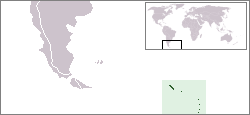Falkland Islands Dependencies
| Falkland Islands Dependencies | ||||||
| British colony | ||||||
| ||||||
| ||||||
| Motto "Desire the right" | ||||||
| Anthem "God Save the King/Queen" | ||||||
 | ||||||
 | ||||||
| Capital | Stanley | |||||
| Languages | English | |||||
| Government | Crown colony | |||||
| Monarch | ||||||
| - | 1843–1901 | Victoria (first) | ||||
| - | 1952–1985 | Elizabeth II (last) | ||||
| Governor | ||||||
| - | 1843–1848 | Richard Moody (first) | ||||
| - | 1980–1985 | Sir Rex Hunt (last) | ||||
| Legislature | Legislative Council | |||||
| History | ||||||
| - | Established | 1843 | ||||
| - | Argentine invasion | 2 April 1982 | ||||
| - | Liberation | 14 June 1982 | ||||
| - | Dissolution | 1985 | ||||
| Currency | Falkland Islands pound | |||||
Falkland Islands Dependencies was the constitutional arrangement for administering the British territories in Sub-Antarctica and Antarctica from 1843 until 1985.
Background
The arrangements were first enacted by the British Letters Patent of 1843, and subsequently revised in 1876, 1892, 1908, 1917 and 1962. For reasons of practical convenience the Dependencies were governed by Britain through the Falkland Islands Government, constituting however a distinct entity that was not part of the Falkland Islands in political or financial respect.[1]
The territorial scope of the Dependencies varied as particular territories were claimed, annexed, and commercially exploited over an extensive period of time starting with South Georgia in 1775. Responding to repeated inquiries by the Government of Norway in 1905–07, Britain confirmed that the areas in question (between 35° and 80° west longitude) were British based on discoveries, and issued the 1908 Letters Patent extending the Dependencies to incorporate the South Sandwich Islands and Antarctic mainland territory (Graham Land), with a permanent local administration in Grytviken, South Georgia, established in 1909.[2][3]
The territories constituting the Falkland Islands Dependencies in 1908 were listed by the Letters Patent as "the groups of islands known as South Georgia, the South Orkneys, the South Shetlands, and the Sandwich Islands, and the territory known as Graham's Land, situated in the South Atlantic Ocean to the south of the 50th parallel of south latitude, and lying between the 20th and the 80th degrees of west longitude". In 1917, the Letters Patent were modified, applying the "sector principle" used in the Arctic; the new scope of the Dependencies was extended to comprise "all islands and territories whatsoever between the 20th degree of west longitude and the 50th degree of west longitude which are situated south of the 50th parallel of south latitude; and all islands and territories whatsoever between the 50th degree of west longitude and the 80th degree of west longitude which are situated south of the 58th parallel of south latitude", thus reaching the South Pole.[4][5][6]
The new international legal regime introduced in the Antarctic territory south of 60° south latitude by the 1961 Antarctic Treaty prompted Britain to separate the part of Dependencies that became subject to the Treaty. That was done by a 1962 Order in Council that established the British Antarctic Territory, leaving in the Dependencies only the island groups of South Georgia and the South Sandwich Islands, including Shag Rocks and Clerke Rocks. Eventually, in 1985 the Dependencies became the distinct British overseas territory of South Georgia and the South Sandwich Islands.[7][8]
With the accession of the United Kingdom to the European Communities in 1973, the Falkland Islands Dependencies became one of the EU Overseas Countries and Territories under the Treaty of Rome, a status upheld by all subsequent EU treaties. That status of association is presently enjoyed by Dependencies successors, i.e., South Georgia and the South Sandwich Islands and the British Antarctic Territory.[9]
See also
- History of South Georgia and the South Sandwich Islands
- Sovereignty of South Georgia and the South Sandwich Islands
- History of the Falkland Islands
- British Antarctic Territory
- Special member state territories and their relations with the EU
References
- ↑ R.K. Headland, The Island of South Georgia, Cambridge University Press, 1984. ISBN 0-521-25274-1
- ↑ Odd Gunnar Skagestad. Norsk Polar Politikk: Hovedtrekk og Utvikslingslinier, 1905–1974. Oslo: Dreyers Forlag, 1975
- ↑ Thorleif Tobias Thorleifsson. Bi-polar international diplomacy: The Sverdrup Islands question, 1902–1930. Master of Arts Thesis, Simon Fraser University, 2004.
- ↑ National Interests and Claims in the Antarctic, p. 19, Robert E. Wilson
- ↑ R.K. Headland, The Island of South Georgia, Cambridge University Press, 1984.
- ↑ The Ross Dependency. The Geographical Journal, Vol. 62, No. 5 (Nov. 1923), pp. 362–365.
- ↑ The British Antarctic Territory Order in Council, 1962. Her Majestys Stationery Office: Statutory Instrument 1962 No. 400.
- ↑ CIA World Factbook 1996: South Georgia and the South Sandwich Islands.
- ↑ European Commission: Information on the Overseas countries and territories
.svg.png)
